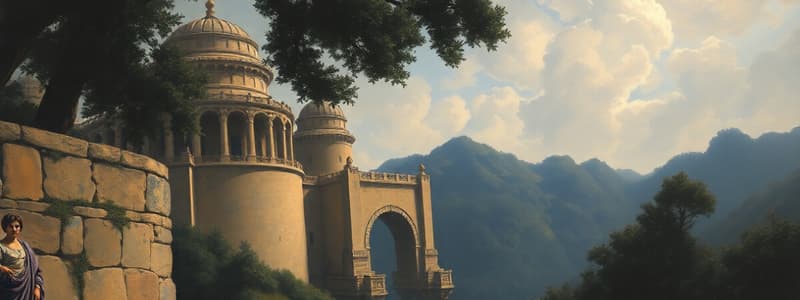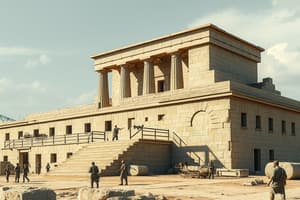Podcast
Questions and Answers
Which factor was LEAST influential in the emergence of ancient civilizations?
Which factor was LEAST influential in the emergence of ancient civilizations?
- Geographic isolation from other human populations. (correct)
- Development of agriculture and settled communities.
- Establishment of complex systems of governance.
- Independent invention of writing systems.
How did new technologies impact the nature of warfare during World War I?
How did new technologies impact the nature of warfare during World War I?
- They made naval battles the primary form of engagement.
- They decreased the overall number of battle casualties due to increased precision.
- They led to rapid territorial gains and quick resolution of conflicts.
- They resulted in prolonged trench warfare and unprecedented casualty rates. (correct)
What distinguishes Cultural History from other historical sub-disciplines?
What distinguishes Cultural History from other historical sub-disciplines?
- Its exclusive focus on political and military events.
- Its examination of cultural expressions, beliefs, and practices of societies. (correct)
- Its emphasis on economic systems and trade networks.
- Its concentration on quantifiable demographic data.
What is the most enduring legacy of the Bhakti movement in India?
What is the most enduring legacy of the Bhakti movement in India?
How did Mahatma Gandhi's philosophy influence the Indian independence movement?
How did Mahatma Gandhi's philosophy influence the Indian independence movement?
Which of the following represents a defining characteristic of a national movement?
Which of the following represents a defining characteristic of a national movement?
What was a primary destabilizing consequence of the Treaty of Versailles following World War I?
What was a primary destabilizing consequence of the Treaty of Versailles following World War I?
Which long-term global impact can be attributed to the events of World War II?
Which long-term global impact can be attributed to the events of World War II?
How do social movements primarily contribute to societal change?
How do social movements primarily contribute to societal change?
Following India's independence, what key challenge persisted despite the nation's progress?
Following India's independence, what key challenge persisted despite the nation's progress?
Flashcards
What is History?
What is History?
The study of past events, people, and societies.
Ancient Civilizations
Ancient Civilizations
Emerged independently, establishing governance, agriculture, and technology.
World War I
World War I
A global conflict from 1914-1918 between the Central Powers and Allied Powers caused by alliances, nationalism and imperial rivalries.
World War II
World War II
Signup and view all the flashcards
Cultural History
Cultural History
Signup and view all the flashcards
Historical Figures
Historical Figures
Signup and view all the flashcards
Social Movements
Social Movements
Signup and view all the flashcards
National Movement
National Movement
Signup and view all the flashcards
Bhakti Movement
Bhakti Movement
Signup and view all the flashcards
Indian Freedom Struggle
Indian Freedom Struggle
Signup and view all the flashcards
Study Notes
- History is the study of the past, encompassing events, people, and societies.
- Ancient civilizations provide insights into the origins of human society.
- World Wars reshaped the global landscape.
- Cultural history explores the evolution of human expression and values.
- Historical figures have left lasting impacts on the course of history.
- Social movements have driven societal change and reform.
Ancient Civilizations
- Ancient civilizations emerged independently in various parts of the world.
- Mesopotamia, in modern-day Iraq, is often considered the cradle of civilization.
- Ancient Egypt was characterized by its pharaohs, pyramids, and hieroglyphic writing.
- The Indus Valley Civilization thrived in present-day Pakistan and northwest India.
- Ancient Greece made significant contributions to philosophy, democracy, and art.
- The Roman Empire dominated the Mediterranean world for centuries.
- The Maya, Aztec, and Inca civilizations flourished in the Americas.
- These civilizations developed complex systems of governance, agriculture, and technology.
- Their legacies continue to influence modern society.
World Wars
- World War I (1914-1918) was a global conflict involving the Central Powers and the Allied Powers.
- The war's causes were a complex web of alliances, nationalism, and imperial rivalries.
- Trench warfare and new technologies, such as machine guns and poison gas, led to unprecedented casualties.
- The Treaty of Versailles imposed harsh terms on Germany, contributing to future instability.
- World War II (1939-1945) was an even more devastating conflict, involving the Axis and Allied Powers.
- The start of the war was Germany's aggression and expansionist policies.
- The Holocaust, the systematic genocide of Jews and other minorities, was a defining event of the war.
- The use of atomic bombs on Hiroshima and Nagasaki led to Japan's surrender.
- The war resulted in the deaths of tens of millions of people and the reshaping of the global order.
Cultural History
- Cultural history examines the cultural expressions, beliefs, and practices of societies throughout time.
- It explores various aspects of culture, including art, literature, music, religion, and customs.
- Cultural history seeks to understand how cultures change and evolve over time.
- It also examines the interactions and exchanges between different cultures.
- Cultural history can provide insights into the values, attitudes, and identities of people in the past.
Historical Figures
- Historical figures are individuals who have played significant roles in shaping history.
- They include political leaders, military commanders, scientists, artists, and activists.
- Their actions and decisions have had a lasting impact on the world.
- Examples include Julius Caesar, Alexander the Great, Joan of Arc, Leonardo da Vinci, and Mahatma Gandhi.
Social Movements
- Social movements are collective efforts to promote or resist social change.
- They often arise in response to perceived injustices or inequalities.
- Social movements can take various forms, including protests, demonstrations, strikes, and boycotts.
- Examples include the civil rights movement, the women's suffrage movement, and the environmental movement.
- Social movements have played a crucial role in advancing social justice and equality.
National Movement
- A national movement is a political and social movement aimed at achieving national self-determination or unity.
- It often involves a shared sense of national identity and a desire for independence or autonomy.
- National movements have played a significant role in shaping the modern world, leading to the creation of new nation-states.
- Examples include the Indian independence movement and the Irish independence movement.
Bhakti Movement
- The Bhakti movement was a Hindu religious movement that emphasized devotion and love for God.
- Originating in South India in the 7th century, it then spread throughout the subcontinent.
- Bhakti saints emphasized personal experience and devotion over ritual and dogma.
- They composed devotional songs and poems in vernacular languages, making religion accessible to ordinary people.
- The Bhakti movement promoted social equality and challenged traditional caste hierarchies.
Indian Freedom Struggle
- The Indian freedom struggle was a mass movement aimed at ending British colonial rule in India.
- It was led by Mahatma Gandhi, who advocated for nonviolent resistance.
- Other key figures in the movement included Jawaharlal Nehru, Sardar Vallabhbhai Patel, and Subhas Chandra Bose.
- The movement involved various forms of protest, including civil disobedience, boycotts, and strikes.
- India achieved independence on August 15, 1947.
Post-Independence India
- Post-independence India faced numerous challenges, including poverty, inequality, and communal tensions.
- The country adopted a democratic political system and a mixed economy.
- India made significant progress in various fields, including agriculture, industry, and technology.
- However, challenges such as corruption, poverty, and environmental degradation persist.
- India has emerged as a major global power in the 21st century.
Studying That Suits You
Use AI to generate personalized quizzes and flashcards to suit your learning preferences.




